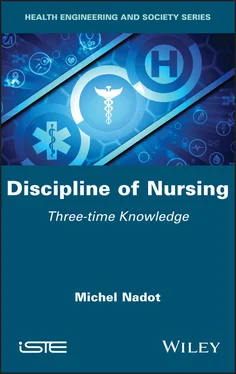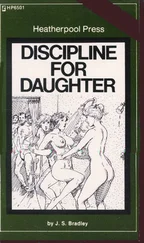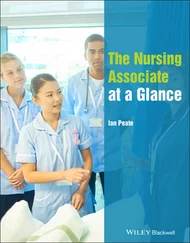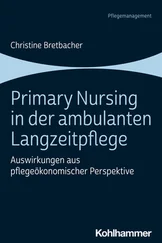Michel Nadot - Discipline of Nursing
Здесь есть возможность читать онлайн «Michel Nadot - Discipline of Nursing» — ознакомительный отрывок электронной книги совершенно бесплатно, а после прочтения отрывка купить полную версию. В некоторых случаях можно слушать аудио, скачать через торрент в формате fb2 и присутствует краткое содержание. Жанр: unrecognised, на английском языке. Описание произведения, (предисловие) а так же отзывы посетителей доступны на портале библиотеки ЛибКат.
- Название:Discipline of Nursing
- Автор:
- Жанр:
- Год:неизвестен
- ISBN:нет данных
- Рейтинг книги:5 / 5. Голосов: 1
-
Избранное:Добавить в избранное
- Отзывы:
-
Ваша оценка:
- 100
- 1
- 2
- 3
- 4
- 5
Discipline of Nursing: краткое содержание, описание и аннотация
Предлагаем к чтению аннотацию, описание, краткое содержание или предисловие (зависит от того, что написал сам автор книги «Discipline of Nursing»). Если вы не нашли необходимую информацию о книге — напишите в комментариях, мы постараемся отыскать её.
Discipline of Nursing — читать онлайн ознакомительный отрывок
Ниже представлен текст книги, разбитый по страницам. Система сохранения места последней прочитанной страницы, позволяет с удобством читать онлайн бесплатно книгу «Discipline of Nursing», без необходимости каждый раз заново искать на чём Вы остановились. Поставьте закладку, и сможете в любой момент перейти на страницу, на которой закончили чтение.
Интервал:
Закладка:
During 1970–1980 or so, work on the history of the nursing profession gained momentum within the French-speaking community with the work of historians and/or anthropologists intrigued by traditions relating to the body, health, the dimensions of care and the practical and identity-related conditions of those who provided it. Marie-Françoise Collière, then professor at the École internationale d’enseignement infirmier supérieur de Lyon 1 (EIEIS), paved the way for reflection in 1982 by publishing a historical–anthropological work on care, a work that was noticed by the profession at the international level [COL 82]. Ten years later, she identified with great foresight the difficulties encountered by researchers in nursing sciences when they were interested in the history of their profession.
Restoring the professional group’s memory is not a matter of course. The writings of women caregivers are indeed quite rare. They have an oral tradition and have not left many traces of their activity. “Either they are not introduced to writing or they are denied access to it so as not to write their own writings” [COL 92]. Not very initiated to writing, this is the case of those who were presented as governesses, servants, hospital maids under the Ancien Régime2 and graduate nurses until the end of the 20th Century. We also know that historical sources relevant to the nursing profession and the history of women are not always kept in an official archive department. The public archives “were constituted by men on the actions of men; women only appear in the background, when they appear” [DIÉ 88]. Some hospital archives are rather difficult to access due to the lack of awareness of places of memory.
After the difficulties related to the sources of care practice, Collière also mentions the difficulties related to the subject itself. “Care belongs first and foremost to the history of daily life, of which it is one of the major components. Now, this daily experience is not spectacular; it is part of the mundane, the obvious, what is repeated, but which we cannot do without” [COL 92]. Any elucidation of the history of care practices risks threatening the status quo established within the discipline, because it is representative of the place and role assigned to women caregivers by institutional authorities. If the nurse thinks that she is working in the natural sciences (medicine), discovering that this is not the case and that her discipline is more in the humanities can destabilize the constructed identity. Moreover, for Collière, historical works do not reach “the deculturated mass of midwives, nurses who − with a few exceptions − are unaware of their publication, do not see the interest, do not feel concerned 3 . Moreover, this is not the concern of professional leaders who, for the most part, are unaware of history or fear its questions” [COL 92]. Nearly 30 years later, we can generally see that this statement still applies!
We can agree with some of the students’ concerns. History does not really help to heal. But it has never displayed that purpose! Nor does it help to apply an ordinary healing technique. It does not help to master the knowledge and daily gestures necessary to take care of people who expect service from nurses. This disillusionment among some students taking a history course when they are impatient to discover their future place of work so that they can finally “be able to give injections or treatments”, to use a cliché, means that the history resulting from fundamental research on the discipline does not provide them with any means of establishing their know-how. This is a fact. The impact of history has no relevance if the motivation to know the traditions of language and where one comes from is met with indifference or incomprehension.
On the contrary, history helps students to build an identity in order to position themselves among the many health professions. It allows them to emancipate themselves from the role attributed to them in the 18th Century by medicine and the ruling classes. “From the nurse’s aide, whose subordinate tasks are defined with industrial precision, to the ‘professional’ nurse, who translates the doctor’s prescriptions into tasks for nurses’ aides, the status of nurses is that of uniformed servants in the service of dominant male professionals” [EHR 15]. We may agree with this view, but the word “domestic” perhaps deserves some attention. It had some value at the time it was introduced. It is then beneficial if the so-called domestic activity is seen as one that makes it possible, in the noble sense of the term, to take care of the life of the estate, the Domus , the house, the hospital, that is, of the living environment of care, of the languages required and of the first spaces of speech. Apart from this kind of representative alienation of women from domestic and free work, which is very present at the beginning of institutional care , it already requires some spatio-temporal skills to understand the organization required for a collective household to function.
History is the mother of all human sciences, Michel Foucault told us [FOU 66]. This is an important statement for the nursing discipline. Nursing is concerned with the human being, and therefore belongs to the human sciences. Are today’s doctors of the nursing sciences aware of this? Now, the history of our language traditions is part of the first research to be carried out in order to imagine an identity for our discipline. “It is indeed more important for a discipline to determine the identity of its knowledge than to question the identity of the people who refer to it” [NAD 12a]. One does not become a nurse before using knowledge of the same nature as the proclaimed identity. History clearly shows that the title “nurse” is a myth for lay people [NAD 12b]. It came into being before the conceptualization of knowledge took shape or before the “nursing metaparadigm” and its theories became known. At a time when charitable and welfare institutions are growing and common sense is mixing their values or ideologies at the end of the 18th Century, it is important to rediscover according to which values and in which space of origin the activity of those who today are seeking a scientific identity to give to their own discipline began. In the French-speaking tradition, in the first half of the 20th Century, people began to call themselves “nurses” after having been given an identity imposed by doctors. This was in reference to a Franco-Catholic model of care (nuns), but before having been able to give a name to the discipline and conceptualize theoretical conceptual models in nursing or care theories.
It is the weight of the past that makes the invention of the future possible, it is said. This statement by the French historian Fernand Braudel highlights the fact that history brings to individuals the substance of their consciousness. Without history, individuals are condemned to follow the system of the moment. Not always giving the right place to historical knowledge in a training program, especially for nurses, or not evaluating the knowledge acquired in the field, also allows leaders (in our case, in the health field) or other disciplines to better instrument the values and ideologies of a field. When nurses seen as cheaply trained labor are sometimes manipulated, for example solely on the basis of health costs or socio-economic needs, they cannot fail to assert themselves in the name of their language traditions, convince politicians of their actions, form a scientific identity or participate in the critique of reason. If we are not careful, one day, for economic reasons, we will end up replacing nurses with their assistants. “The concept of identity thus refers both to the permanence of the social means of recognition and to the capacity of the subject to give lasting meaning to his or her experience” [SAI 85].
Читать дальшеИнтервал:
Закладка:
Похожие книги на «Discipline of Nursing»
Представляем Вашему вниманию похожие книги на «Discipline of Nursing» списком для выбора. Мы отобрали схожую по названию и смыслу литературу в надежде предоставить читателям больше вариантов отыскать новые, интересные, ещё непрочитанные произведения.
Обсуждение, отзывы о книге «Discipline of Nursing» и просто собственные мнения читателей. Оставьте ваши комментарии, напишите, что Вы думаете о произведении, его смысле или главных героях. Укажите что конкретно понравилось, а что нет, и почему Вы так считаете.












